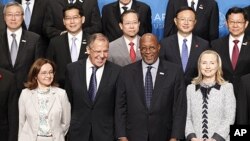U.S. Trade Representative Ron Kirk says talks by Asia Pacific trade ministers, who have been meeting this week in Hawaii, have been productive. On Saturday and Sunday, the leaders of the 21 economies of the Asia Pacific Economic Cooperation forum will be featured. The exchanges have focused on trade, and senior officials, including U.S. Secretary of State Hillary Clinton, have also discussed strategic and human rights issues.
U.S. Trade Representative Ron Kirk says he expects that APEC leaders will be able to announce the broad outlines of a Trans-Pacific Partnership when they meet over the weekend. He says the initiative could lead to a free-trade zone in the Asia Pacific region. The nine nations involved in the talks so far include the United States, Australia, Chile, Singapore, Vietnam and several other APEC members.
Japanese Prime Minister Yoshihiko Noda said Friday his nation wants to join the dialogue. Trade official Kirk said in a written statement that the United States welcomes the move, but he cautioned that Japan must be ready to address barriers in agriculture, services and manufacturing.
He said APEC offers a forum for ambitious initiatives like this one.
“APEC has traditionally been a laboratory for some of the best and newest ideas in global commerce," he said. "And we believe the outcome of this year's meeting will help keep APEC's agenda on the cutting edge for the next 20 years.”
U.S. Secretary of State Hillary Clinton also spoke with her counterparts at the conference about global concerns, holding talks with senior officials from China, Japan, Australia, Indonesia and Vietnam, and leading discussions with other APEC members.
She noted that a recent report by the International Atomic Energy Agency raised serious questions about weapons-related work that Iran has undertaken as part of its nuclear program. Iran has rejected the report's findings as politically motivated.
Clinton also repeated concerns about what she called the escalating violence by the Syrian government against its people.
On issues closer to home for these Asia Pacific nations, the U.S. secretary of state said North Korea poses a security threat to its neighbors while it disregards the rights of its citizens. She noted that the United States held exploratory talks with North Korea two weeks ago, hoping to restart negotiations stalled in 2009.
“We made clear what we expect North Korea to do in order to get back to talks, including concrete steps toward denuclearization,” she said.
She said senior American officials have also visited Burma and reported on positive steps by the country's new government, including talks with opposition leader Aung San Suu Kyi, enactment of a new labor law and changes to the law on political party registration.
“It appears that there are real changes taking place on the ground, and we support these early efforts at reform," Clinton said. "We want to see the people of Burma able to participate fully in the political life of their own country.”
She said remaining problems in Burma include the detention of political prisoners, human rights abuses and violence in ethnic minority areas.
APEC talks will continue through Sunday, as APEC government leaders tackle trade and other issues, including the global financial crisis. U.S. President Barack Obama will host the leaders' summit Sunday and hold bilateral talks with the presidents of Russia and China and the prime minister of Japan.
US Officials See Trade Progress, Share Global Concerns at APEC




